32 healthy dinner ideas that are filling, nutritious and packed with flavour
Stuck in a dinner rut? These healthy dinner ideas will breathe some new life into your evening meal schedule


These healthy dinner ideas will provide plenty of inspiration when it comes to switching up your evening meals and are all packed with nutrients.
Healthy dinners should be low in fat but still contain some healthy fats, as well as a diverse range of nutrients. Our selection of healthy dinners are low in refined carbs, high in fibre and make a good contribution towards your five a day. Whether your goal is to lose a stone in a month or to get more fibre in your diet, these dinner ideas will help you achieve your health goals.
From comforting stews and pasta dishes to fresh salads and stir fry meals, and inventive ways to prepare your favourite veg, these are 32 healthy dinner ideas (that could also work for a nutritious lunch).
Healthy dinner ideas to try now
Grilled tofu with mango salad

Tofu is an excellent choice when it comes to vegetarian protein as it's also high in vitamins, low in fat and packed with fibre. Grill or air fry your tofu with a honey and sesame seed glaze and team with a fresh shredded salad.
So Good: Food you want to eat, designed by a nutritionist | £17.99 at Amazon
This Sunday Times bestseller is one of the best cookbooks for healthy, nutritionally balanced meals that you'll actually want to eat. Featuring 80 recipes all steeped in nutritional science, So Good explains the principles of healthy eating in an accessible (and fun) way.
Grilled chicken salad

Grilled chicken with a fresh salad and homemade dressing is a low-fat, high-protein dinner option. Load up your salad with plenty of plant diversity to get more nutrients into your diet (strive for a range of different colours) and try a simple dressing of lemon juice, extra virgin olive oil, salt and pepper to introduce some healthy fats into the dish.
Grilled aubergine with pureed butter beans

Another tasty veggie option is meaty aubergine, which tastes delicious griddled and topped with olive oil and herbs. Serve with a dip such as mashed butter beans or pureed lentils, or add in some shop-bought hummus into the mix if you're short on time, for an extra protein hit.
Butternut squash with feta and herbs

Butternut squash is a versatile veg that can be topped with all sorts of fresh foods for a tasty dinner. We love a combination of feta and parsley for a Mediterranean twist, but you could also try chickpeas, herbs and yoghurt, or roasted walnuts and honey.
Sign up to our free daily email for the latest royal and entertainment news, interesting opinion, expert advice on styling and beauty trends, and no-nonsense guides to the health and wellness questions you want answered.
Tuna Niçoise salad
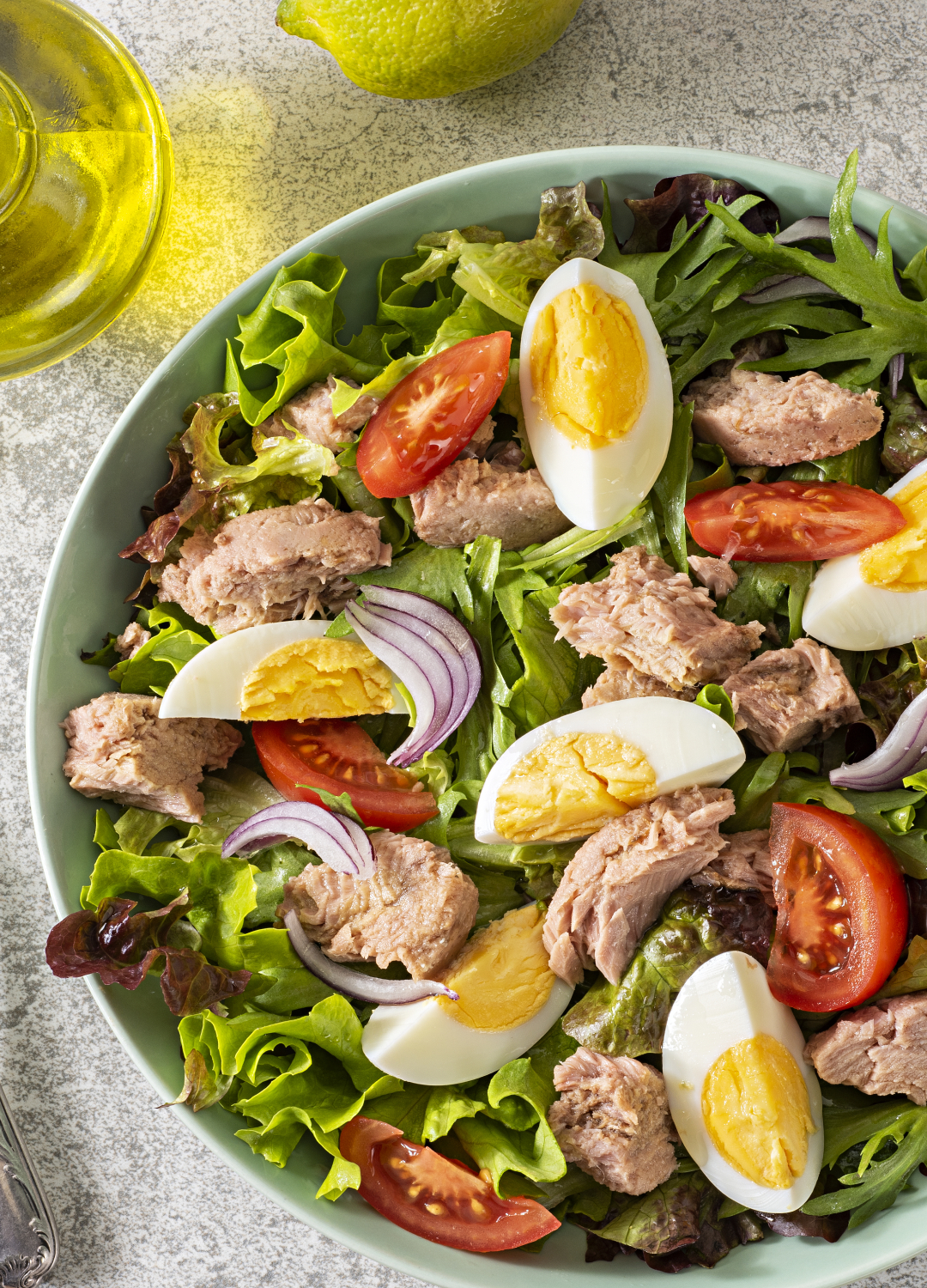
Tuna Niçoise is a classic salad that's more filling thanks to its additions of high protein tuna and eggs. Add in some roasted potatoes to make it a heartier dish as an evening meal.
Pea and asparagus spaghetti

A light pasta dish packed with green veg is the perfect spring or summer evening meal. Combine crème fraîche, lemon and black pepper for a simple sauce and add in plenty of green veg like peas, asparagus and spinach for a nutritionally dense dinner.
Prawn and green bean stir fry
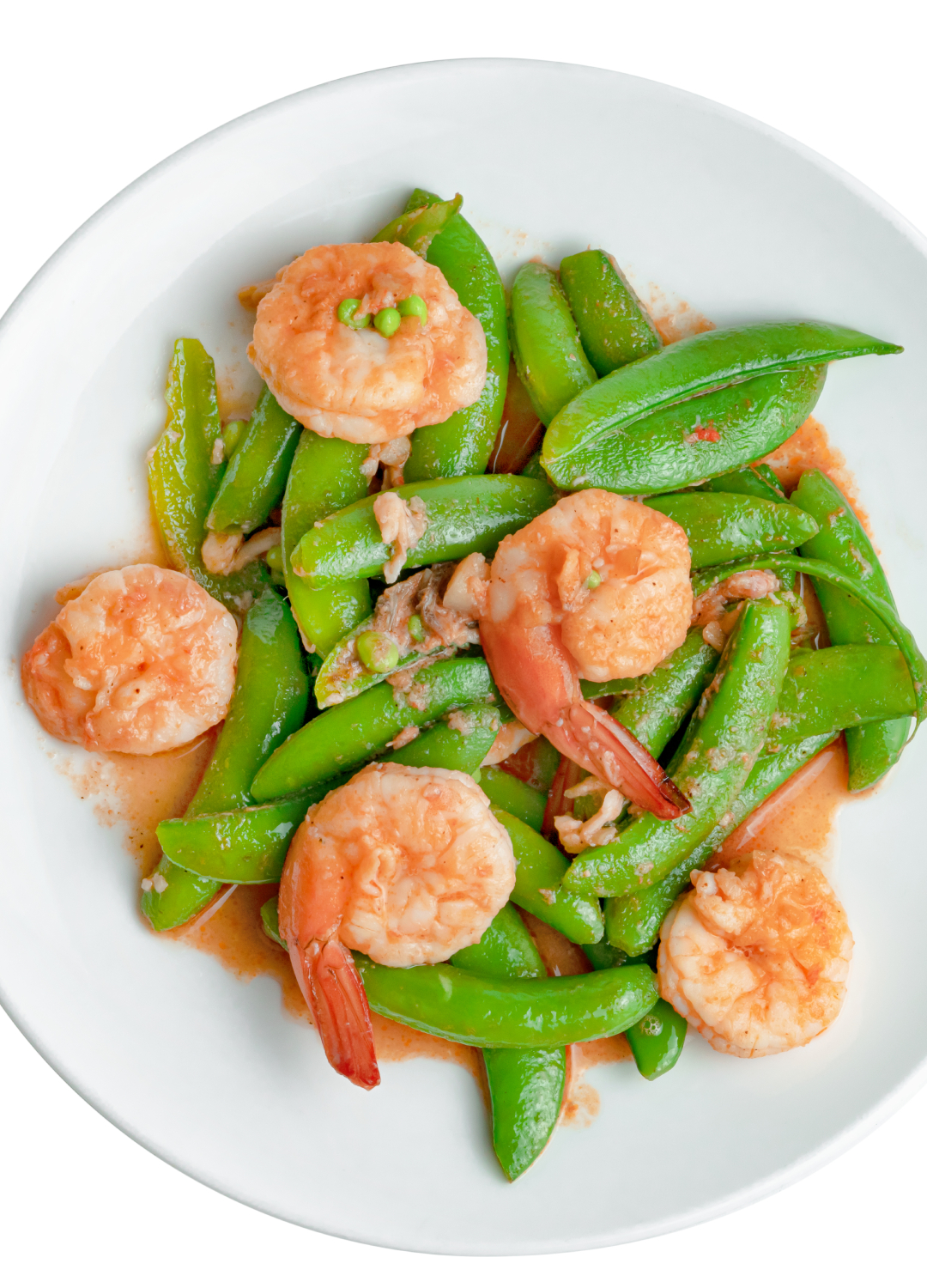
Lightly stir frying food as a method of cooking is a great way to maintain their freshness. Prawns are a great source of protein while still being low fat, while green beans are packed with vitamins and minerals. A simple garlic, chilli and ginger marinade is all you need for a quick and easy evening meal.
Chicken curry

A classic chicken curry dish is not only delicious, but can be a healthy evening meal with a few simple swaps. Make your own paste by combining spices, chilli, garlic, tomato paste, onion and ginger and bulk our with chopped tomatoes rather than cream.
Salmon steak and salad
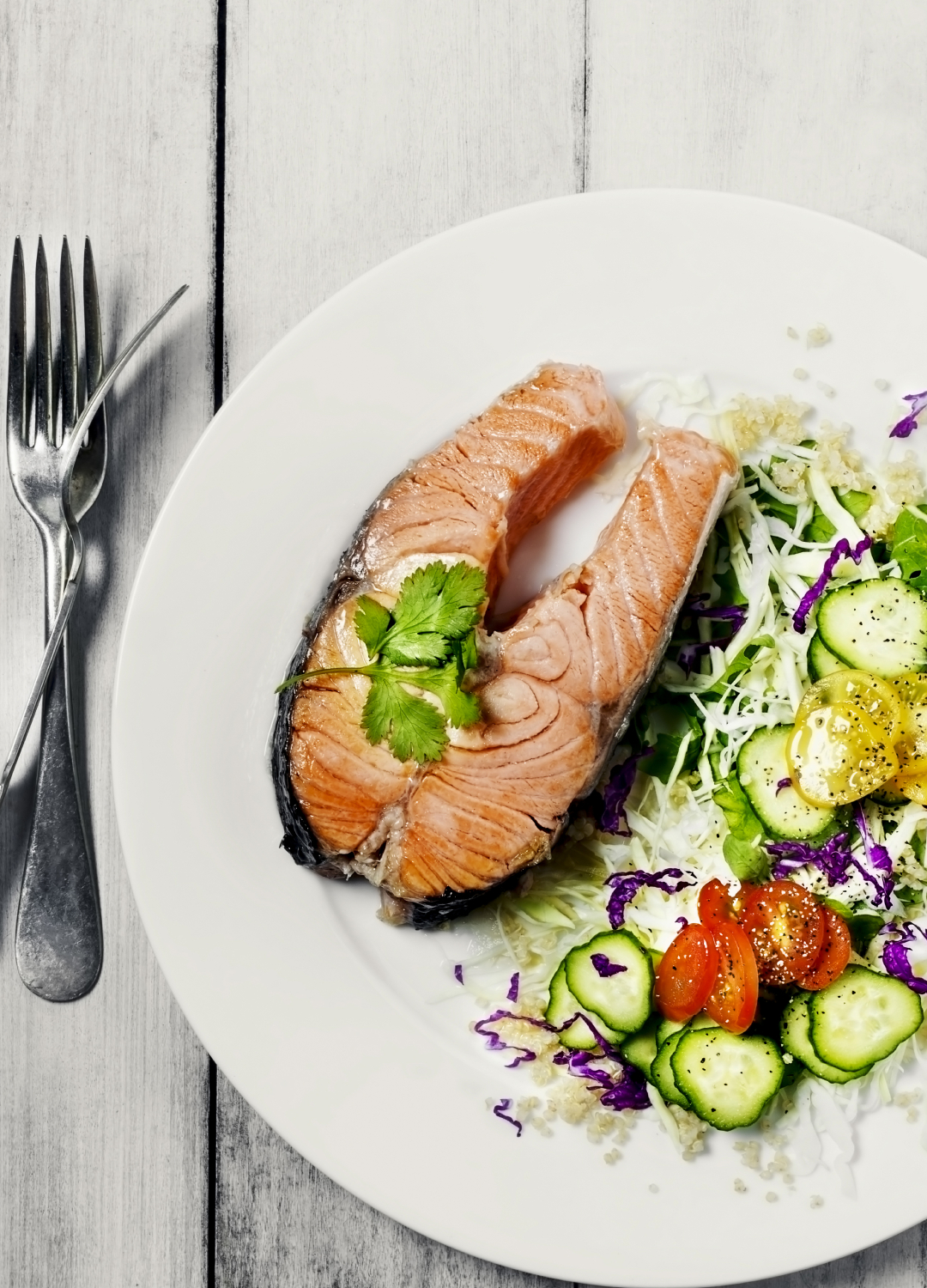
Salmon has so many brilliant health benefits, from being an excellent source of healthy fat to boosting brain health. It's a filling choice as well, meaning a simple side salad is all you need - or you could add in a few digestive health-boosting sweet potatoes as a carbohydrate.
Pumpkin soup

Like sweet potato and butternut squash, pumpkin contains beta-carotene, which reduces inflammation in the body and helps to boost the immune system. Whizz up fresh pumpkin, vegetable stock and garlic for a quick and easy midweek soup that can be saved for lunch as well.
Poke bowl

Poke is a dish that consists of fresh meat, fish or raw fish, salad, rice and raw vegetables. Poke bowls usually offer a diverse range of fibre and protein, meaning they're a great evening meal for bumping up nutrients.
Spicy grilled mackerel with green salad and veg

Affordable and packed with goodness, mackerel is a fish that's often overlooked but has plenty of plus points. It works particularly well with chilli and lemon, for a simple dressing that can be drizzled on after grilling.
Pumpkin curry

Pumpkin or butternut squash are a great meat substitute for meat or fish thanks to their dense texture. Marinade in cumin and oil and roast in the over before adding to a curry sauce for a delicious veggie curry.
Grilled courgette and avocado Buddha bowl
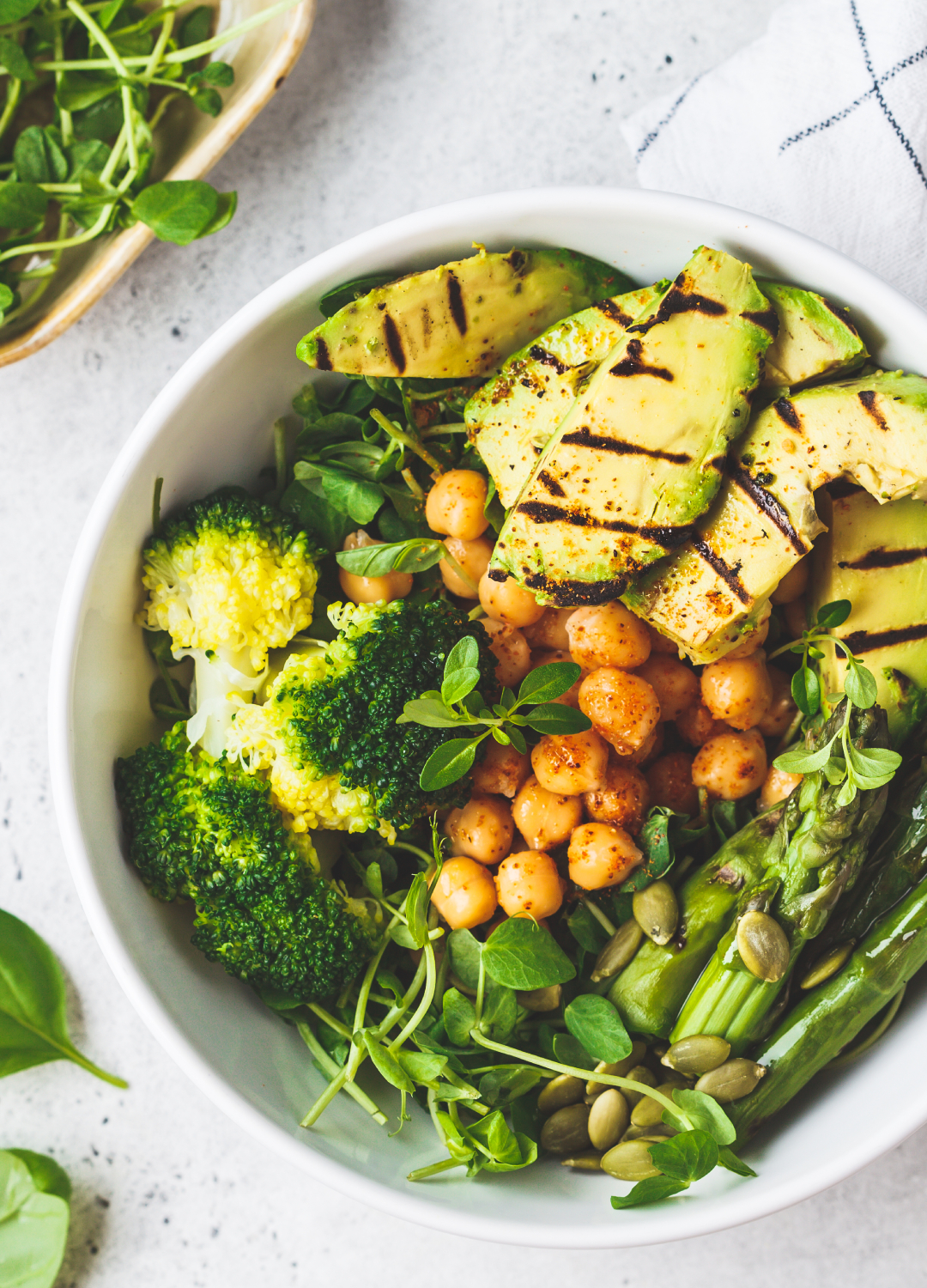
Like poke bowls, Buddha bowl are a chance to pack your evening meal with nutrients, adding anything from grilled courgette or aubergine to roasted chickpeas, fresh fish, seafood or chicken. Opt for rice, couscous or quinoa as a base and then load up with a range of salad leaves, fruit, vegetables and protein.
Spaghetti with a red pepper sauce

Whizz up tomatoes, pepper, onion and chilli for a super easy, yet delicious pasta sauce. If you want to make it a healthier dinner option, swap white pasta for wholemeal, or a plant-based low-carb alternative like spelt spaghetti.
Stir-fried beef with vegetables and rice

Stir-fry is King when it comes to easy evening meals and offers the opportunity to get plenty of diversity onto your plate. Lean, low-fat beef pairs perfectly with a medley of peppers, onions and broccoli.
Beef stew

Stew is a hearty winter meal that's packed with nutritional goodness, but it also works well as a lighter summer meal served with crusty bread. Cook beef in stock and red wine, adding in sliced potatoes and carrots for an easy midweek meal you can leave to take care of itself.
Pasta salad with pesto, tomatoes, mozzarella and basil

Pasta salad is a great dish to make in bulk and is delicious hot or cold as an evening or lunchtime meal. Add in mozzarella, cherry tomatoes and torn basil for an Italian-style salad that's packed with flavour.
Griddled chicken with tomatoes and basil

The great thing about this griddled chicken with tomatoes and basil is that it's a one-pot dish that saves on washing up, as well as being a simple and flavourful dinner. Serve simply seasoned chicken and tomatoes with creamy mash or rice for a simple yet satisfying dinner.
Vegan tacos

Tacos always bring a little bit of fun to your evening meal and are a great way to bulk up on nutrients. Try homemade salsa, guacamole, fresh herbs and sour cream on the side, and top you tacos with roasted veg, chicken or prawns.
Fried pork and vegetables

Take a little inspiration from Greece with this dish of fried pork with herby potatoes and a simple Greek salad. Low in fat and high in nutrients it's a great way to sample the Mediterranean diet at home.
Prawns and raw asian salad
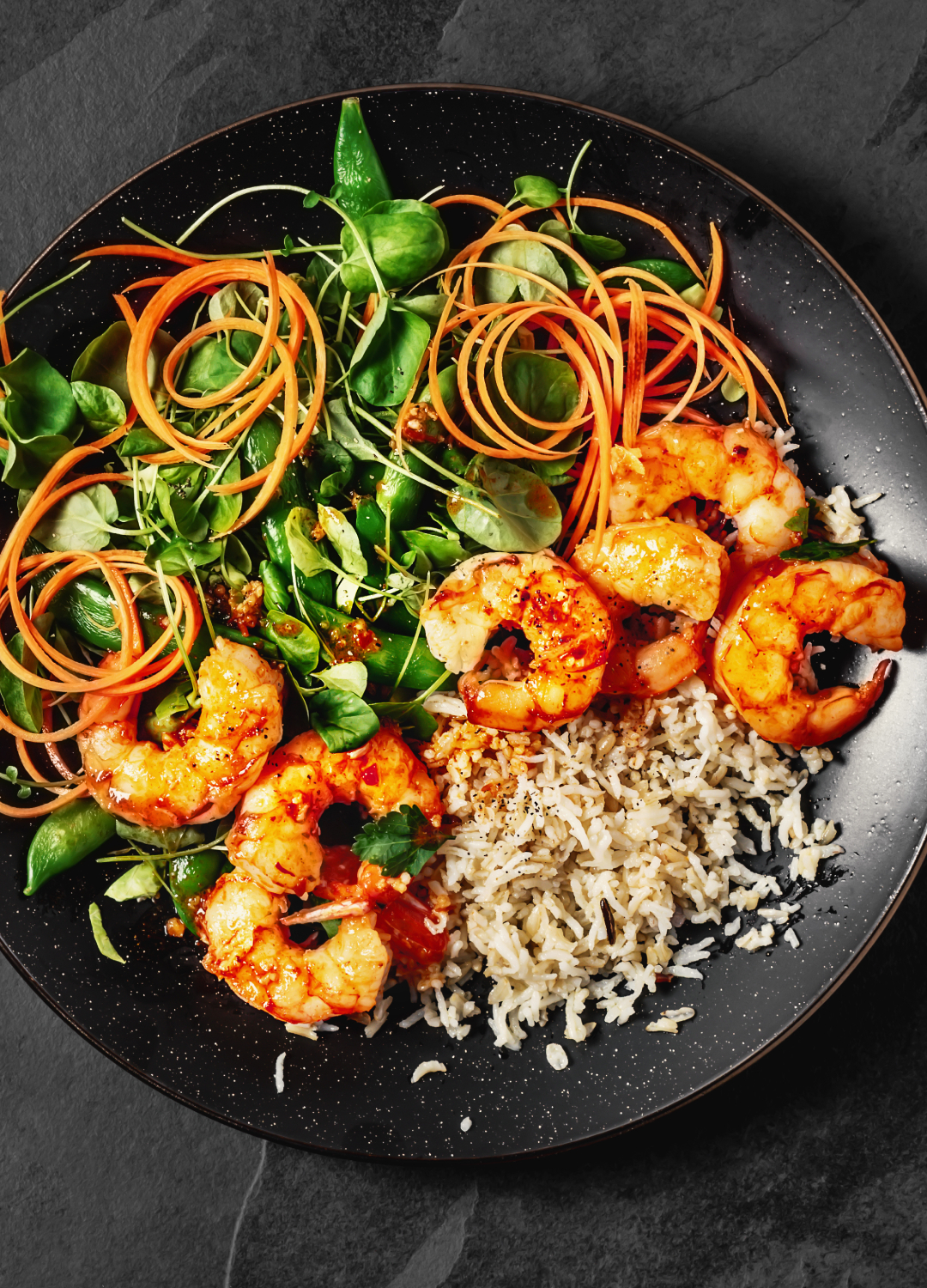
A raw salad will pack more of a nutritional punch - just make sure you don't eat your evening meal too late to ensure there's enough time to digest any raw veg used. Shredded cucumber, carrot, papaya and mango all work perfectly with fried spicy prawns.
Spaghetti and meatballs

Homemade meatballs can be a healthy yet comforting choice and you could opt for chicken or turkey meatballs for a lower fat option. A simple homemade tomato sauce and fresh basil is all you need to complete the pasta dish.
Steak and feta salad with green veg

Steak is a low-fat protein that pairs well with a fresh salad. Add in some feta cheese makes this simple dish more filling, while a homemade dressing of lemon juice and extra virgin olive oil ensures the dish is balanced with healthy fats.
Tofu ramen with noodles

Tofu is super versatile thanks to its dense texture that tastes great with a marinade grilled, fried or air-fried. For a filling and comforting dish, add to a simple broth with noodles, boiled egg, spring onions and any veggies you like.
Chicken with tomato salsa and vegetables

A simple chicken dish can be elevated with a fresh tomato topping and a drizzle of healthy fat olive oil. Team with green veg like peas, broccoli, asparagus and spinach for a nutritional boost.
Salmon traybake

Traybake dishes are a simple way to feed a family during the week with minimal effort. Healthy salmon will work well with sliced potatoes and roasted veg like onions or peppers with a simple side salad on the side.
Chickpea Buddha bowl
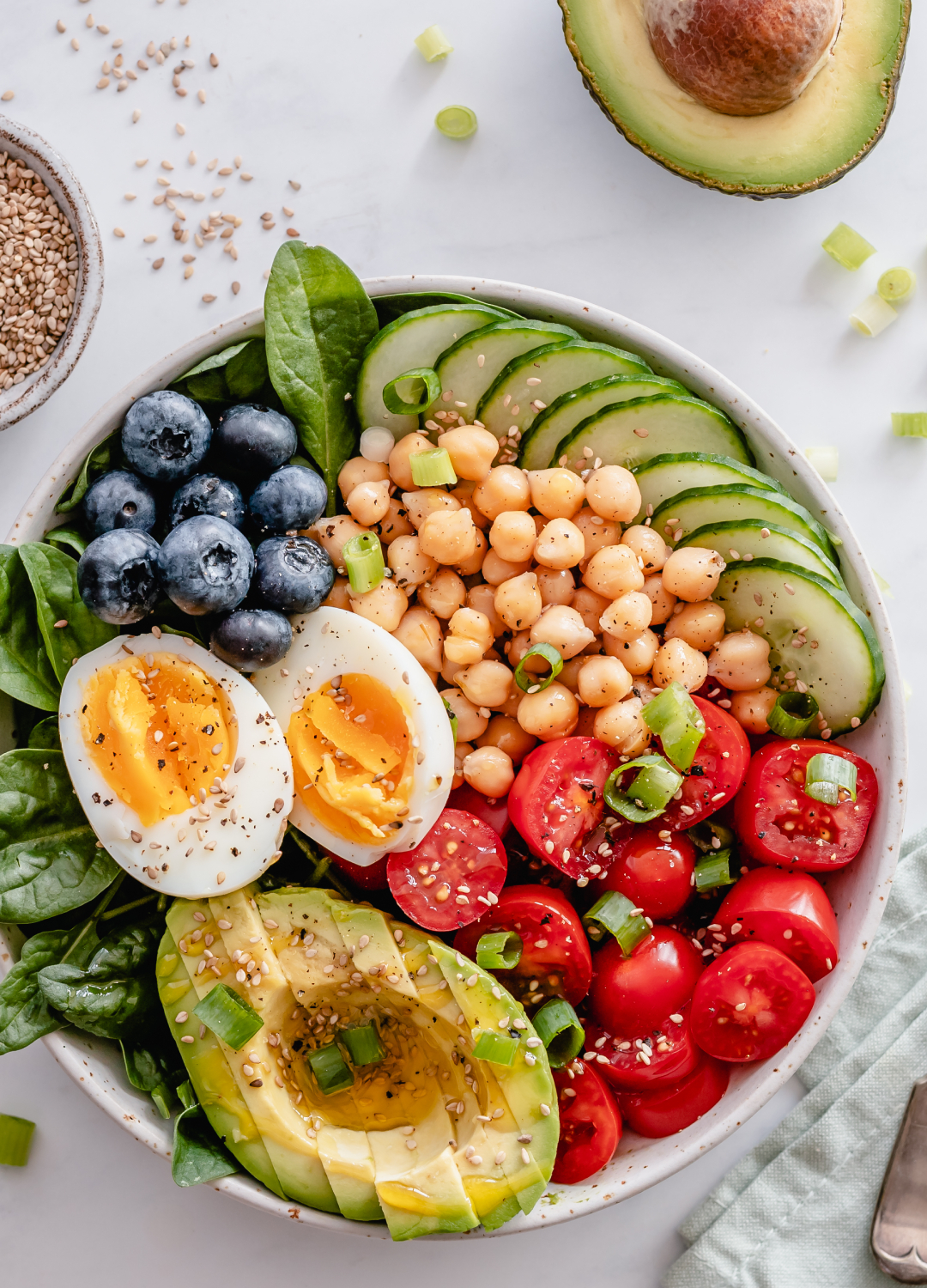
As a high source of protein, chickpeas are also an excellent base for a Buddha bowl. Serve raw with lemon juice and pepper, or roast with spices like cumin and serve with rice, quinoa or couscous, eggs, avocado, salad, herbs and vegetables.
Aubergine masala

Aubergine, like sweet potato or butternut squash, is a great base for a veggie curry and is high in antioxidants like vitamins A and C, which help protect your cells against damage and free radicals. Team with wild rice rather than white for an extra health boost.
Caesar salad

A caesar salad is a classic that can be made more healthy by making your own croutons (chopped up bread, roasted with oil) and using yoghurt as a base for the caesar dressing.
Grilled cod with lentil puree

Protein-rich cod will soak up the flavours of a marinade or seasoning well, and it pairs with pretty much any veg. A lentil or butterbean puree is a great accompaniment for adding a different texture and bumping up nutritional value.
Fish stew

Fish stew is a very high protein dish that's perfect for using up any leftovers from other dishes and can be frozen for future meals. A one-pot meal, it doesn't take too long to prepare and can feed the whole family.
Lauren is the former Deputy Digital Editor at woman&home and became a journalist mainly because she enjoys being nosy. With a background in features journalism, Lauren worked on the woman&home brand for four years before going freelance. Before woman&home Lauren worked across a variety of women's lifestyle titles, including GoodTo, Woman's Own, and Woman magazine.

